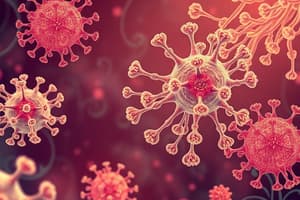Podcast
Questions and Answers
What is the definition of an antigen?
What is the definition of an antigen?
- An agent that can induce an immune response
- A large carrier molecule
- An agent that can specifically bind to components of the immune response (correct)
- A molecule with low molecular weight
What is the definition of an immunogen?
What is the definition of an immunogen?
- An agent that can specifically bind to components of the immune response
- An agent that can induce an immune response (correct)
- A molecule with low molecular weight
- A large carrier molecule
What happens to haptens when coupled with carrier macromolecules?
What happens to haptens when coupled with carrier macromolecules?
- They become immunogenic (correct)
- They lose their immunogenicity
- They prevent immune response
- They degrade rapidly
What are antigen determinants (ADS) or epitopes?
What are antigen determinants (ADS) or epitopes?
Why do changes in antigen determinants influence the specificity of antigen molecules?
Why do changes in antigen determinants influence the specificity of antigen molecules?
What type of molecule is penicillin antibiotic?
What type of molecule is penicillin antibiotic?
What is antigen valency?
What is antigen valency?
What is cross reactivity?
What is cross reactivity?
Which factor influences immunogenicity by increasing the degree of foreignness?
Which factor influences immunogenicity by increasing the degree of foreignness?
What type of substances are potent immunogens according to the text?
What type of substances are potent immunogens according to the text?
What is the function of an adjuvant in immunogenicity?
What is the function of an adjuvant in immunogenicity?
What is the minimum molecular weight for a substance to be considered a potent immunogen?
What is the minimum molecular weight for a substance to be considered a potent immunogen?
Which route of administration induces better immune response according to the text?
Which route of administration induces better immune response according to the text?
What is the disadvantage of cross reactivity mentioned in the text?
What is the disadvantage of cross reactivity mentioned in the text?
What type of substances are non-immunogenic unless conjugated with proteins according to the text?
What type of substances are non-immunogenic unless conjugated with proteins according to the text?
What influences the degree of immunogenicity as chemical complexity increases?
What influences the degree of immunogenicity as chemical complexity increases?
Flashcards
Antigen
Antigen
A substance that can trigger an immune response by binding to antibodies or immune cells.
Immunogen
Immunogen
A type of antigen that can induce an immune response, generating antibodies or immune cells.
Hapten
Hapten
Small molecules that can bind to antibodies but cannot induce an immune response on their own.
Antigen Determinants (Epitopes)
Antigen Determinants (Epitopes)
Signup and view all the flashcards
Antigen Valency
Antigen Valency
Signup and view all the flashcards
Cross-reactivity
Cross-reactivity
Signup and view all the flashcards
Immunogenicity
Immunogenicity
Signup and view all the flashcards
Adjuvants
Adjuvants
Signup and view all the flashcards
Parenteral Administration
Parenteral Administration
Signup and view all the flashcards
Disadvantage of Cross-reactivity
Disadvantage of Cross-reactivity
Signup and view all the flashcards
Non-Immunogenic Substances
Non-Immunogenic Substances
Signup and view all the flashcards
Chemical Complexity and Immunogenicity
Chemical Complexity and Immunogenicity
Signup and view all the flashcards
Foreignness and Immunogenicity
Foreignness and Immunogenicity
Signup and view all the flashcards
Potent Immunogens
Potent Immunogens
Signup and view all the flashcards
Molecular Weight and Immunogenicity
Molecular Weight and Immunogenicity
Signup and view all the flashcards
Hapten-Carrier Conjugation
Hapten-Carrier Conjugation
Signup and view all the flashcards
Study Notes
Antigens and Immunogens
- An antigen is a substance that can trigger an immune response, binding to antibodies or immune cells.
- An immunogen is a type of antigen that can induce an immune response, generating antibodies or immune cells.
Haptens
- Haptens are small molecules that can bind to antibodies but cannot induce an immune response on their own.
- When haptens are coupled with carrier macromolecules, they can trigger an immune response.
Antigen Determinants (Epitopes)
- Antigen determinants (ADS) or epitopes are the specific regions on an antigen molecule that are recognized by antibodies or immune cells.
- Changes in antigen determinants influence the specificity of antigen molecules because they affect the binding sites for antibodies or immune cells.
Antigen Properties
- Penicillin antibiotic is a hapten, a small molecule that can bind to antibodies but cannot induce an immune response on its own.
- Antigen valency refers to the number of binding sites on an antigen molecule.
- Cross-reactivity occurs when an antibody or immune cell binds to multiple antigens with similar epitopes.
Immunogenicity
- Increasing the degree of foreignness of an antigen influences its immunogenicity.
- Potent immunogens are typically complex molecules, such as proteins, polysaccharides, or lipids.
- The function of an adjuvant is to enhance the immunogenicity of an antigen by increasing the immune response.
- The minimum molecular weight for a substance to be considered a potent immunogen is approximately 4,000-6,000 Da.
Administration and Immune Response
- The route of administration that induces a better immune response is parenteral (injection), as it allows for direct delivery of the antigen to immune cells.
Disadvantages and Limitations
- The disadvantage of cross-reactivity is that it can lead to false positive results in diagnostic tests or autoimmune diseases.
Non-Immunogenic Substances
- Small molecules, such as haptens, are non-immunogenic unless conjugated with proteins.
- Chemical complexity influences the degree of immunogenicity, with more complex molecules being more immunogenic.
Studying That Suits You
Use AI to generate personalized quizzes and flashcards to suit your learning preferences.




